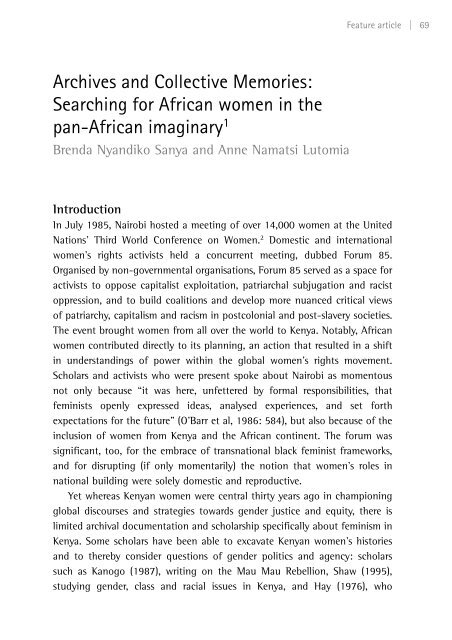You also want an ePaper? Increase the reach of your titles
YUMPU automatically turns print PDFs into web optimized ePapers that Google loves.
Feature article | 69<br />
Archives <strong>and</strong> Collective Memories:<br />
Searching for African women in the<br />
pan-African imaginary 1<br />
Brenda Ny<strong>and</strong>iko Sanya <strong>and</strong> Anne Namatsi Lutomia<br />
Introduction<br />
In July 1985, Nairobi hosted a meeting of over 14,000 women at the United<br />
Nations’ Third World Conference on Women. 2 Domestic <strong>and</strong> international<br />
women’s rights activists held a concurrent meeting, dubbed Forum 85.<br />
Organised by non-governmental organisations, Forum 85 served as a space for<br />
activists to oppose capitalist exploitation, patriarchal subjugation <strong>and</strong> racist<br />
oppression, <strong>and</strong> to build coalitions <strong>and</strong> develop more nuanced critical views<br />
of patriarchy, capitalism <strong>and</strong> racism in postcolonial <strong>and</strong> post-slavery societies.<br />
The event brought women from all over the world to Kenya. Notably, African<br />
women contributed directly to its planning, an action that resulted in a shift<br />
in underst<strong>and</strong>ings of power within the global women’s rights movement.<br />
Scholars <strong>and</strong> activists who were present spoke about Nairobi as momentous<br />
not only because “it was here, unfettered by formal responsibilities, that<br />
feminists openly expressed ideas, analysed experiences, <strong>and</strong> set forth<br />
expectations for the future” (O’Barr et al, 1986: 584), but also because of the<br />
inclusion of women from Kenya <strong>and</strong> the African continent. The forum was<br />
significant, too, for the embrace of transnational black feminist frameworks,<br />
<strong>and</strong> for disrupting (if only momentarily) the notion that women’s roles in<br />
national building were solely domestic <strong>and</strong> reproductive.<br />
Yet whereas Kenyan women were central thirty years ago in championing<br />
global discourses <strong>and</strong> strategies towards gender justice <strong>and</strong> equity, there is<br />
limited archival documentation <strong>and</strong> scholarship specifically about feminism in<br />
Kenya. Some scholars have been able to excavate Kenyan women’s histories<br />
<strong>and</strong> to thereby consider questions of gender politics <strong>and</strong> agency: scholars<br />
such as Kanogo (1987), writing on the Mau Mau Rebellion, Shaw (1995),<br />
studying gender, class <strong>and</strong> racial issues in Kenya, <strong>and</strong> Hay (1976), who


